Under the Weather, Under the Influence
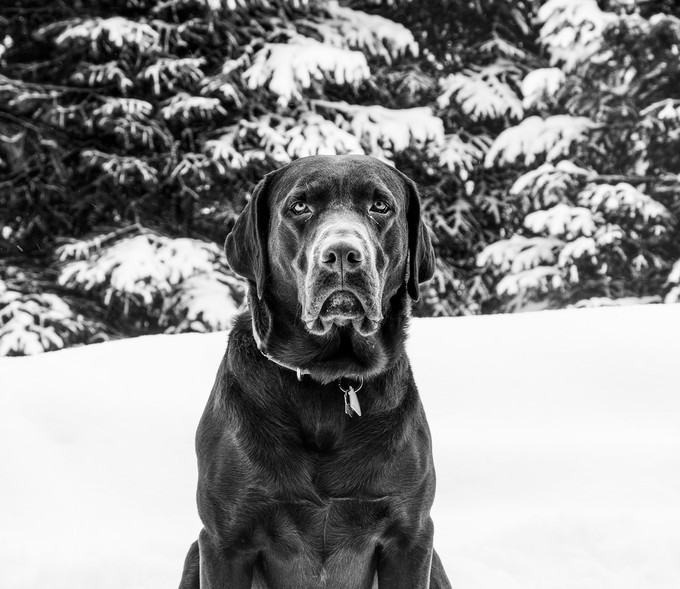
Winter is over, isn't it? rawpixel.com
It seems safe now to talk about the weather. No more donning double layers of long underwear. No more chanting my winter mantra, 'Stay Vertical'. And no more dog booties! The freedom! The joy! I recently heard radio interviews raving about the wonders of spring and railing against the evils of winter (dog booties were not mentioned). I recall similar interviews last December which focused on the fabulousness of snow.
Feelings, like the weather, change moment to moment.
In fact, the weather itself can change our feelings from moment to moment. Studies report that on sunny days we tip more, the stock market rallies, and our credit cards see more action. On cloudy days, in contrast, our short term memory is enhanced, and we're more likely to apply to difficult college programmes.
You may be wondering what this has to do with dogs. On the most obvious level, dogs' behaviours change with the weather. For instance, on clement days, my dogs are mesmerized by the Great Outdoors. I am forced to demand their attention with cues like 'touch' and 'look'. However, in high winds or snow squalls, the dogs freely offer such behaviours, often uncued and with a tinge of urgency. So under crap conditions, checking in with me is better than scouting for racoon poop. Nice to know.
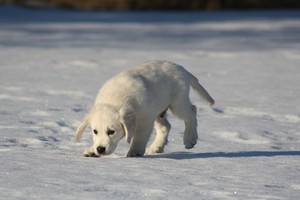
Good luck competing with scents on snow for your dog's attention
We humans are at least partially aware of the weather's influence on our behaviour. But many environmental stimuli remain completely outside our awareness. For example, experiments have shown that holding a hot or a cold drink will influence whether we perceive strangers as warm and open or cool and reserved. And if we fill in a questionnaire while sitting on a hard chair, vs. a cushy one, our answers are more socially conservative, or more 'hard ass'. Who knew? As scientist/author Robert Sapolsky notes: "Sensory information streaming toward your brain from both the outside world and your body can rapidly, powerfully, and automatically alter behaviour."
And of course the same goes for our dogs.
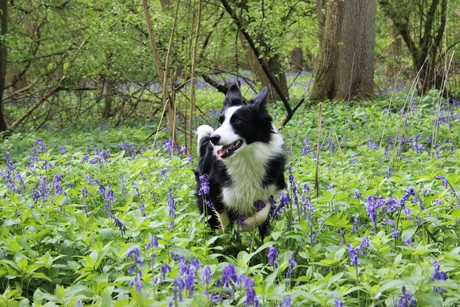
Spring fling. Dreamstime.com
Before summer arrives and makes it too hot to think, I've been mulling over what this means for our puppy pals. We pay a lot of attention to things in the environment that stimulate or trigger our dogs. Men in hats might be terrifying, wads of paper towel strangely addictive. We know what our dogs lunge for, what makes them pancake, what they studiously ignore. We usually know when to get out of Dodge, when to distract with bacon bits, and when to encourage self-soothing behaviours ("Yes, pee on that, if you must").
But maybe we should pay more attention to the key influencers in their lives, namely ourselves, the dogs' human companions. How much do our feelings and behaviours impact them? And I'm not just talking whether we click'n'treat, or pull off the idealized 5:1 ratio of positive to aversive interactions. I'm talking about the emotional soup the dogs swim in everyday, by virtue of their cohabitation and companionship with us.
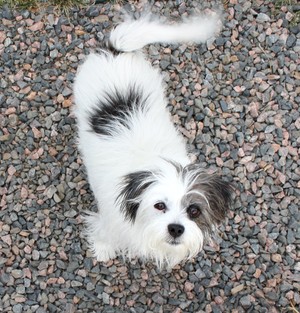
How are you feeling today?
Scientists are interested in the same question. Did you know that when dogs are exposed to the sweat from humans who watched scary videos, the dogs' heart rates increase and they act more stressed? Think about that the next time you settle in to watch a horror flick on a Friday night. More significantly, a recent study looked at human attachment styles and found they impacted separation anxiety in dogs. Another study looked at 'social referencing', i.e. how human behaviour guides puppies' reactions in novel situations. These studies confirm our Influencer role, and the puppy one is especially intriguing (check it out below).
So, should responsible HCs rush to take personality inventories, do mood disorders assessments and, if needed, fling ourselves into therapy in order to re-work our attachment styles? Maybe. I'd prefer a more low key approach, though. Instead we could simply ask this (admittedly new agey) question: "Too tight? Or too loose?"
Are you too uptight, too activity-driven, too vigilant? Or too laissez-faire, too hedonistic, too oblivious? (If you think you inhabit the mythical golden mean, please check your perception with the people around you).
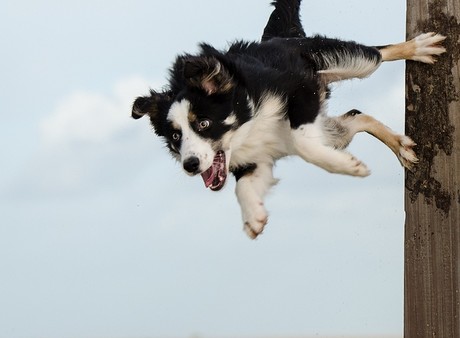
Forge ahead!
Anyway, if you're too uptight, work on relaxing, especially with your dog. You probably work all the time anyway, so why not work on relaxing? Try learning canine massage, and ease up on the tricks training. On the other hand, if you're too loose, your dog might need a bit more walking and training, and less couch time (you too, natch).
But for now it's spring, so forge ahead into all those stunning environmental stimuli, both known and unknown (the crocuses! the coccidia!). And enjoy the thrill of life without booties.
FURTHER READING
https://www.elte.hu/en/content/secure-owners-calm-dogs.t.984?fbclid=IwAR2bLKP7zRsJgLcqjR3o8URG6j_AoTGYDUZn-7R2Jf8_8cdrSi3t8ThIZn0
https://thesciencedog.com/2019/04/10/the-emotional-life-of-puppy-stanley/
Behave: The Biology of Humans at Our Best and Worst, by Robert M. Sapolksy, Penguin Books, 2017.